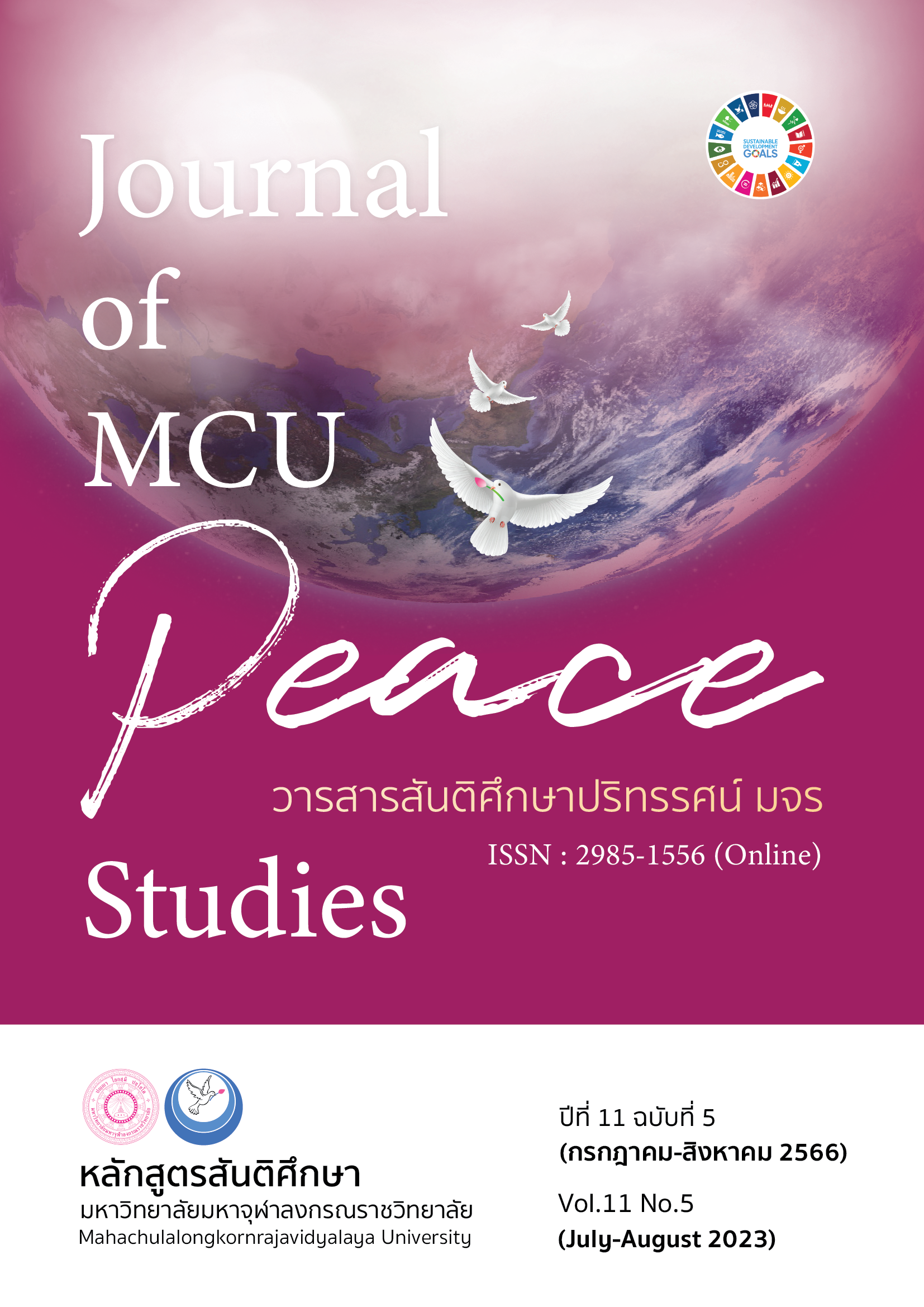รูปแบบการพัฒนาครูด้านการจัดการเรียนรู้ในยุคดิจิทัล ของสถานศึกษาอาชีวศึกษาเอกชน
Main Article Content
บทคัดย่อ
บทความวิจัยครั้งนี้มีวัตถุประสงค์เพื่อ 1) ศึกษาสภาพการพัฒนาครูด้านการจัดการเรียนรู้ในยุคดิจิทัลของสถานศึกษาอาชีวศึกษาเอกชน 2) สร้างรูปแบบการพัฒนาครูด้านการจัดการเรียนรู้ในยุคดิจิทัลของสถานศึกษาอาชีวศึกษาเอกชน 3) ทดลองใช้รูปแบบการพัฒนาครูด้านการจัดการเรียนรู้ในยุคดิจิทัลของสถานศึกษาอาชีวศึกษาเอกชน 4) ประเมินรูปแบบการพัฒนาครูด้านการจัดการเรียนรู้ในยุคดิจิทัลของสถานศึกษาอาชีวศึกษาเอกชน การวิจัยครั้งนี้เป็นการวิจัยแบบผสมผสาน กลุ่มตัวอย่างที่ใช้ในการศึกษาเป็น ผู้บริหารสถานศึกษาหรือครู ได้มาโดยใช้เกณฑ์ตาราง เครจซี่และมอร์แกน และสัมภาษณ์ผู้บริหารสถานศึกษาอาชีวศึกษาเอกชน จำนวน 3 คนจาก 3 สถานศึกษา ได้มาโดยการเลือกแบบเจาะจง เครื่องมือที่ใช้ในการเก็บรวบรวมข้อมูลเป็นแบบสอบถาม แบบสัมภาษณ์แบบกึ่งมีโครงสร้าง แบบประเมินรูปแบบและคู่มือรูปแบบ สถิติที่ใช้ในการวิจัยได้แก่ ค่าเฉลี่ย ส่วนเบี่ยงเบนมาตรฐานและการวิเคราะห์เนื้อหา
ผลการวิจัยพบว่า 1. สภาพการพัฒนาครูด้านการจัดการเรียนรู้ในยุคดิจิทัล โดยรวมอยู่ในระดับปานกลาง ( =3.43, S.D.=0.73) 2. ผลการสร้างรูปแบบการพัฒนาครูด้านการจัดการเรียนรู้ในยุคดิจิทัล มี 5 องค์ประกอบหลัก ได้แก่ 1) หลักการ 2) วัตถุประสงค์ 3) วิธีการดำเนินการ 4) แนวทางการประเมินผล 5) เงื่อนไขความสำเร็จ วิธีการดำเนินการมี 3 องค์ประกอบ ได้แก่ 1) การจัดการเรียนรู้แบบโครงงาน 2) การจัดการเรียนรู้แบบเชิงรุก 3) การจัดการเรียนรู้ออนไลน์ โดยประกอบด้วย 4 กระบวนการ ได้แก่ (1) การวางแผนในการพัฒนาครู (2) การดำเนินการในการพัฒนาครู (3) การติดตามและการประเมินผลการพัฒนาครู และ (4) การปรับปรุงการพัฒนาครู 3. ผลการทดลองใช้รูปแบบการพัฒนาครูด้านการจัดการเรียนรู้ในยุคดิจิทัลของสถานศึกษาอาชีวศึกษาเอกชน มีการปฏิบัติคิดเป็นร้อยละ 95.00 4. ผลการประเมินรูปแบบการพัฒนาครูด้านการจัดการเรียนรู้ในยุคดิจิทัลของสถานศึกษาอาชีวศึกษาเอกชน พบว่า ความเหมาะสม ความเป็นไปได้ และความเป็นประโยชน์ โดยรวมรวมอยู่ในระดับมาก (
= 4.20, S.D.=0.76)
Article Details

อนุญาตภายใต้เงื่อนไข Creative Commons Attribution-NonCommercial-NoDerivatives 4.0 International License.
ทัศนะและความคิดเห็นที่ปรากฏในบทความในวารสาร ถือเป็นความรับผิดชอบของผู้เขียนบทความนั้น และไม่ถือเป็นทัศนะและความรับผิดชอบของกองบรรณาธิการ ยินยอมว่าบทความเป็นลิขสิทธิ์ของวารสาร
เอกสารอ้างอิง
Chamchoi, S. (2018). School Management in Digital Era. Bangkok: Chulalongkorn University Printing House.
Chawanna, D. (2015). The Strategies for Vocational Competency Development of Teachers under the Institute of Northern Vocational Education Region 4. (Doctoral Dissertation). Kamphaeng Phet Rajabhat University. Kamphaeng Phet.
Chooha, U. et al. (2019). A Study of the Satisfaction of Using the Zoom Cloud Meeting Application to Help Teach in the Midwifery Practice Course. Journal Mahasarakham Hospital, 16(1), 176-186.
Choositong, I., Pawabutra, C., & Suwannatrai, W. (2020). Model for Teachers Development in Using Information Technology and Communication for Learning Activities in Primary Schools under Regional Education Office No.11. Neu Academic and Research Journal, 10(2), 98-112.
Gerdruang, A. (2017). Empowering Learning in the 21st Century for Thailand Society in the Digital Age. Academic Journal Lampang Rajabhat University, 6(1), 173-184.
Meerakha, P. (2017). Teacher's Characteristic of 21st Century. MBU Education Journal Faculty of Education Mahamakut Buddhist University, 5(2), 23-35.
Office of the National Economics and Social Development Council. (2016). National Economics and Social Development Plan No. 12 (2017-2021). Bangkok: Office of the National Economics and Social Development Council.
Padiworn, N. (2020). A Digital Technology Skill Development Model If School Administrator under Office of the Basic Education Commission. (Doctoral Dissertation). Ubon Ratchathani Rajabhat University. Ubon Ratchathani.
Pandam, S. (2020). How to Turn Crisis into Opportunity of Thai Vocational Education on the New Normal. Journal of Social Science and Buddhistic Anthropology, 5(7), 1-13.
Phulsawasdi, W., Wetcha, P., Rattanachowong, P., & Tunkaew, S. (2018). Administration and Management of Technical to Enhance the Competitive Thailand’s Education 4.0 of CTECH Pacific Collage of Technology. VRU Research and Development Journal, 13(1), 8-16.
Puetmongkol, S., & Uthairat, W. (2015). A High-Quality Digital Technology Management Model based on International Standards of Secondary School in the Southern Regions of Thailand. Academic Journal Eastern Asia University Social Sciences and Humanities, 5(2), 274-283.
Rakkiatwong, N. (2016). Reform of Vocational Education in Thailand. Retrieved June 19, 2020, from https://tdri.or.th/wp-content/uploads/2016/08/nuthasid-vocational-education-v02_2.pdf
Ratheeswari, K. (2018). Information Communication Technology in Education. Journal of Applied and Advanced Research, 3(1), 45-47.
Rueangrong, P. et al. (2014). Educational Technology with Thai Teachers in the 21st Century. Panyapiwat Journal, 5(Special), 195-207.
Salavati, S. (2016). Use of Digital Technologies in Education. (Doctoral Dissertation). Linnaeus University. Sweden.
Srinon, R., Srinon, U., Yommadit, W., & Kitnoppakiat, K. (2018). Active Learning Management in the Era of Thailand 4.0. Journal of Educational Administration Silpakorn University, 9(2), 331- 343.
Suwannarat, S., & Jariyaporn, S. (2015). A Study on Guidelines for Promote and Developing Vocational Education Teacher to ASEAN Community. Academic Journal Bangkokthonburi University, 4(1), 213-223.
Trilling, B., & Fadel, C. (2009). 21st Century Skills: Learning for Life in Our Times. San Fransisco: Jossey-Bass A Wiley Imprint.
Wayo, W., Charoennukul, A., Kankaynat, C., & Konyai, J. (2020). Online Learning under the COVID-19 Epidemic: Concepts and Applications of Teaching and Learning Management. Regional Health Promotion Center 9 Journal, 14(34), 285-298.


